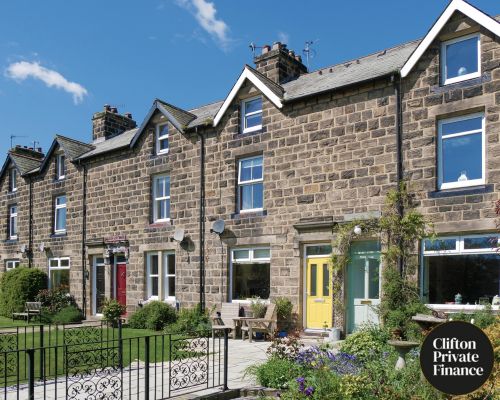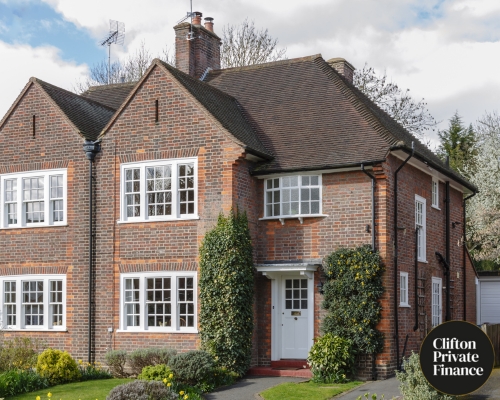Categories
How can I get an interest-only mortgage?

Minimise your monthly payments and free up your cash for other priorities: school fees, supporting a growing business, or other investments.
It all sounds very attractive. And increasing numbers of lenders are now offering interest-only mortgages. But is this the right kind of borrowing for you, and can you find a bank that's willing to lend to you?
What is an interest only mortgage?
With an interest-only mortgage you repay only the interest on the mortgage. At the end of the term you still owe the original amount you borrowed.
With a standard "repayment" mortgage, each month you repay a small part of the capital you’ve borrowed to buy your property, along with the interest on the outstanding loan.
Repayments are usually structured so you’re repaying primarily interest at the start of the mortgage, and making serious inroads into the capital repayment later on.
When you get to the end of your 25-year mortgage term you’ll have paid off all the capital, you’re mortgage-free and you own your property outright.
Why would I want an interest only mortgage?
- The monthly repayments are substantially lower than for a capital repayment mortgage.
- Money is cheap to borrow, with interest rates currently lower than they have been for many years. (Though the picture could change post-Brexit.)
- You want to use your monthly income for something else: funding a rental property, or other investments, paying for school fees – whatever.
- You’re confident that property prices are rising so consistently that the property will be worth enough at the end of the mortgage term to repay the original loan.
- You can commit to selling up in 25 years’ time, even if the property’s your home.
- The increase in value will comfortably repay the original loan AND buy you somewhere else to live at the end of the mortgage term.
- Or you have investments or a pension payout you will be able to use to repay the capital loan.

You need to consider how all these situations can look very different if interest rates rise significantly.
And if property prices actually fall – as they did in the early 80s, again at the beginning of the 90s, and in 2008.
Many homeowners were left in "negative equity": owing more on their mortgages than their house was now worth. If they sold up they still owed their mortgage company money.
What’s a part-and-part mortgage?
Pretty much what it says on the tin: this is a hybrid of repayment and interest-only mortgages:
- You repay some of your mortgage capital as you go, but not all of it.
- The proportion of how much is repayable and how much is interest-free can be negotiated.
- At the end of your mortgage term there will still be a lump sum to be repaid to the lender, but not as much as if you were on an interest-only mortgage.
- What proportion of your borrowing you can have as interest-only will depend on your loan to value (LTV) ratio. How big is the deposit you’ve put down, compared with how much the bank is lending you?
- Your mortgage lender will need to approve your repayment strategy – just as for an interest-only mortgage.
- If your circumstances change – for example, you get a big promotion – and you’re now able to handle bigger repayments each month, you may want to switch to a 100% repayment mortgage to be making greater inroads on your capital sum.
- Most lenders should be willing to let you switch.
- But you will be making bigger repayments each month than if you’d had a repayment mortgage from the start.
- If your career structure involves strong promotion prospects after an initial training period, you may need to consider whether you can tighten your belt enough to afford full repayment mortgage payments right from the start.

What’s a retirement interest only mortgage?
Retirement interest only (RIO) mortgages are very similar to standard interest-only mortgages, but with two key differences:
- You only have to prove you can afford the monthly interest payments – you don’t need to have a lump-sum repayment strategy.
- The loan is paid off when you die, or sell your house or move into long-term care.
There's been a huge growth in the number of RIO mortgages offered since the Financial Conduct Authrority reclassified them in March 2018 as standard mortgages rather than a form of equity release, making it possible for mortgage brokers to offer them as an option.
RIO mortgages are aimed at older borrowers – over 55s, over-60s and pensioners – who will find them easier to qualify for than standard interest-only mortgages.
Borrowers who’ve come to the end of their standard interest-only mortgage, and are facing the prospect of having to sell up and move out, may be able to remortgage with a RIO.
- They’re similar to some kinds of equity-release, such as "lifetime mortgages", but you pay off only the interest each month so your monthly payments are lower and you should have something to pay for long-term care, or to leave as an inheritance.
- You are repaying the interest each month – instead of leaving it to grow and grow, as with equity release.
For a retirement interest only mortgage the amount you can borrow is based on your retirement income, and your loan to value ratio.

How do I repay an interest-only mortgage?
Low monthly payments are very attractive. But for a standard interest-only mortgage you’ll need to have a clear plan for how you’ll repay it at the end of the term – sticking your head in the sand isn’t an option.
Mortgage companies will ask you some searching questions about your "repayment strategy", so make sure you're fully prepared before you apply. What they’ll be looking for:
- An endowment policy you’ll be able to cash in
- A pension plan
- Some other savings / investment plan you can redeem
Don’t depend on…
- A "windfall": an inheritance, or a massive salary bonus. That might have been accepted by lenders in the past – much less acceptable now.
- An increase in the value of the property: it would need to more than double in value to pay off your original loan and buy you somewhere similar to live – at today’s prices.
- No mortgage lender wants the bad publicity of turfing out pensioners onto the street to get their money back.
How to manage an interest-only mortgage
- Pay into an endowment plan or regular investment plan to build up the amount you’ll need for repayment.
- Make as many overpayments and lump sum payments as you can afford (and your mortgage agreement allows for).
- Set an annual calendar reminder to review the performance of your repayment strategy investments and check that you’re on track to repay.

Flexibility to overpay on an interest-only mortgage
Interest-only mortgages can be very useful to strong earners who have relatively low base-rate salaries enhanced by "lumpy”"remuneration packages with periodic bonus and dividend payments.
A good broker will be able to find you an interest-deal that allows you to make substantial regular or annual overpayments, or repay the whole mortgage early without early repayment charges (ERCs).
Can I get an interest-only mortgage?
The number of interest-only mortgages on offer has nearly doubled in the past six years, according to Moneyfacts.
But will you qualify?
Many of the new deals are being offered for buy-to-let properties, where a rental income can cover the costs of the borrowing, and sale of the property is the assured repayment strategy.
For would-be homebuyers, gone are the days when interest-only mortgages were the low-cost offering for borrowers who might struggle to meet larger repayment mortgage costs.

Criteria vary from lender to lender, but you’ll be most likely to qualify if:
- You earn at least £50K a year – lenders have more confidence you’ll be able to repay the lump sum at the end of the term.
- You only want to borrow 50% of the property’s value (the other 50% being a deposit you’ve put down, or equity you’ve built up in the property because its value has increased ahead of an original loan you took out for it).
- You’ve got at least £200K equity of the property’s value - if sale of the property is how the mortgage will be repaid.
We can find the right interest-only mortgage for you
As you can see – interest-only isn’t the right kind of borrowing for every property-buyer. And there are options and variations which could make this kind of mortgage work for you.
To get advice on the right finance for your circumstances, and to get the best deal available, you need an experienced mortgage broker who has access to the lending available right across the market – including from private lenders who don’t deal directly with walk-up clients.
Call us to find out what we can arrange for you:
0203 900 4322
And if you've found this blog useful, do pass it on...
2 Year Fixed Rate 60% LTV Subsequent rate 3.59% Interest Only - Yes Product Fee £995 £250 Cashback As at 16 June 2020 5 Year Fixed Rate 60% LTV Subsequent rate 3.59% Interest Only - Yes Product Fee £995 £250 Cashback As at 16 June 2020 5 Year Fixed Rate 75% LTV Subsequent rate 4.50% Interest Only - Yes Product Fee £1995 £250 Cashback As at 16 June 2020 Thank You for your interest - please complete the form below and a member of our team will be in contact.2 Year Fixed
Interest Only Option
1.21% APR
APRC 4%*
5 Year Fixed
Interest Only Option
1.49% APR
APRC 4%*
5 Year Fixed BTL
Interest Only
2.04% APR
APRC 4%*
Contact Us














.png)

